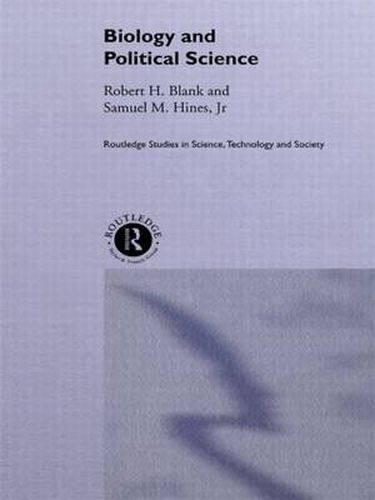Readings Newsletter
Become a Readings Member to make your shopping experience even easier.
Sign in or sign up for free!
You’re not far away from qualifying for FREE standard shipping within Australia
You’ve qualified for FREE standard shipping within Australia
The cart is loading…






Rapid advances in the life sciences, especially molecular biology and neuroscience, combined with research in ethnology and related areas are altering our understanding of human nature and behaviour. They also raise challenging social and political issues that necessitate a re-evaluation of existing social values and structures. However despite the vast implications of this new knowledge of the biological foundations of human behaviour, mainstream political science has largely dismissed and, in some cases, overtly rejected the relevance of biology for political behaviour and institutions. This book redresses the balance. It demonstrates the increasing convergence of interest of some social scientists in the theories, research and findings of the life sciences in building a more interdisciplinary approach to the study of politics. It discusses the development of biopolitics as an academic perspective within political science, reviews the growing literature in biopolitics, and presents a coherent view of biopolitics as a framework for structuring inquiry across the current subfields of political science. Biology and Political Science argues for a shift in the prevailing environmental paradigm - which ignores biology and assumes the empty organism - to an interactive paradigm that provides a balance between biology and culture. It calls for a more human-centred political science that appreciates the contributions of evolutionary theory, ethology, neurobiology and molecular biology in the study of political behaviour and political institutions. The authors believe that this shift in paradigm and methodology will return political science to it roots and encourage a more inclusive. interdisciplinary study of politics. This book will be a valuable new perspective for all those working in political science, social sciences, life sciences, and the history of science.
$9.00 standard shipping within Australia
FREE standard shipping within Australia for orders over $100.00
Express & International shipping calculated at checkout
Rapid advances in the life sciences, especially molecular biology and neuroscience, combined with research in ethnology and related areas are altering our understanding of human nature and behaviour. They also raise challenging social and political issues that necessitate a re-evaluation of existing social values and structures. However despite the vast implications of this new knowledge of the biological foundations of human behaviour, mainstream political science has largely dismissed and, in some cases, overtly rejected the relevance of biology for political behaviour and institutions. This book redresses the balance. It demonstrates the increasing convergence of interest of some social scientists in the theories, research and findings of the life sciences in building a more interdisciplinary approach to the study of politics. It discusses the development of biopolitics as an academic perspective within political science, reviews the growing literature in biopolitics, and presents a coherent view of biopolitics as a framework for structuring inquiry across the current subfields of political science. Biology and Political Science argues for a shift in the prevailing environmental paradigm - which ignores biology and assumes the empty organism - to an interactive paradigm that provides a balance between biology and culture. It calls for a more human-centred political science that appreciates the contributions of evolutionary theory, ethology, neurobiology and molecular biology in the study of political behaviour and political institutions. The authors believe that this shift in paradigm and methodology will return political science to it roots and encourage a more inclusive. interdisciplinary study of politics. This book will be a valuable new perspective for all those working in political science, social sciences, life sciences, and the history of science.